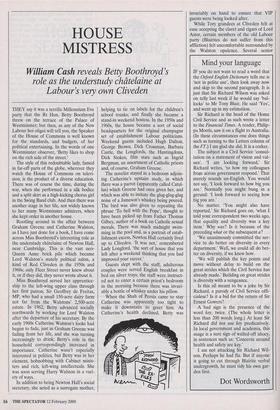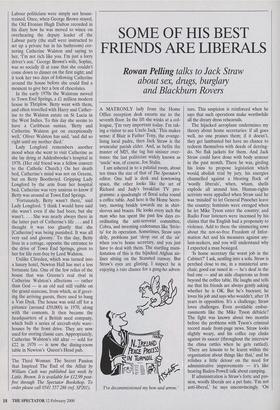HOUSE MISTRESS
William Cash reveals Betty Boothroyd's
role as the understudy chatelaine at Labour's very own Cliveden
THEY say it was a terrific Millennium Eve party that the Rt Hon. Betty Boothroyd threw on the terrace of the Palace of Westminster; but then, as any of the New Labour hoi oligoi will tell you, the Speaker of the House of Commons is well known for the standards, and budgets, of her political entertaining. In the words of one Westminster observer, 'Betty likes to shop on the rich side of the street.'
The style of this redoubtable lady, famed in far-off parts of the globe, wherever they watch the House of Commons on televi- sion, is the product of a diverse education. There was of course the time, during the war, when she performed in a silk bodice and a split skirt as a high-kicking chorus girl in the Swing Band club. And then there was another stage in her life, not widely known to her many Westminster admirers, when she kept order in another house.
Rootling around in the affair between Graham Greene and Catherine Walston, as I have just done for a book, I have come across Miss Boothroyd's interesting role as the understudy chatelaine of Newton Hall, near Cambridge. This is the vast neo- Queen Anne brick pile which became Lord Walston's stately political salon, a kind of Red Cliveden in the 1950s and 1960s; only Fleet Street never knew about it, or if they did, they never wrote about it.
Miss Boothroyd served her apprentice- ship to the left-wing upper class through her first patron, Sir Geoffrey de Freitas, MP, who had a small 150-acre dairy farm not far from the Walston' 2,500-acre estate. In 1962, Betty advanced socially northwards by working for Lord Walston after the departure of his secretary. By the early 1960s Catherine Walston's looks had begun to fade, just as Graham Greene was fading from her life, and she was turning increasingly to drink; Betty's role in the household correspondingly increased in importance. Catherine wasn't especially interested in politics, but Betty was in her element, hobnobbing with Cabinet minis- ters and rich, left-wing intellectuals. She was soon serving Harry Walston in a vari- ety of ways.
In addition to being Newton Hall's social secretary, she acted as a surrogate mother, helping to tie on labels for the children's school trunks; and finally she became a stand-in weekend hostess. In the 1950s and 1960s, the house became a sort of social headquarters for the original champagne set of establishment Labour politicians. Weekend guests included Hugh Dalton, George Brown, Dick Crossman, Barbara Castle, the Longfords, the Huntingdons, Dick Stokes, film stars such as Ingrid Bergman, an assortment of Catholic priests and, of course, Graham Greene.
The novelist stayed in a bedroom adjoin- ing Catherine's upstairs study, in which there was a parrot (apparently called Catul- lus) which Greene had once given her, and which was able to imitate the glug-glug-glug noise of a Jameson's whiskey being poured. The bird was also given to repeating the phrase 'To hell with the Pope', thought to have been picked up from Father Thomas Gilbey, author of a book on Catholic sexual morals. There was much midnight swim- ming in the pool and, as a portrait of estab- lishment excess, Newton Hall certainly lived up to Cliveden. 'It was not,' remembered Lady Longford, 'the sort of house that you left after a weekend thinking that you had improved your career.'
Guests slept with the staff; adulterous couples were served English breakfast in bed on silver trays; the staff were instruct- ed not to enter a certain priest's bedroom in the morning because there was invari- ably a bottle of whiskey under his pillow.
When the Shah of Persia came to stay Catherine was apparently too tight to make it downstairs to greet him. As Catherine's health declined, Betty was invariably on hand to ensure that VIP guests were being looked after.
While Tory grandees at Cliveden felt at ease accepting the claret and cigars of Lord Astor, certain members of the old Labour party (Blairites do not suffer from this affliction) felt uncomfortable surrounded by the Walston opulence. Several senior Labour politicians were simply not house- trained. Once, when George Brown stayed, the Old Etonian Hugh Dalton recorded in his diary how he was moved to wince on overhearing the deputy leader of the Labour party (the staff were instructed to set up a private bar in his bathroom) cor- nering Catherine Walston and saying to her, 'I'm not rich like you. I'm just a lorry driver's son.' George Brown's wife, Sophie, was so socially ill at ease that she couldn't come down to dinner on the first night; and it took her two days of following Catherine around the house before she could find a moment to give her a box of chocolates.
In the early 1970s the Walstons moved to Town End Springs, a £1 million modern house in Thriplow. Betty went with them, and often travelled with Harry and Cather- ine to the Walston estate on St Lucia in the West Indies. To this day she seems to have a Caribbean suntan. 'Betty and Catherine Walston got on exceptionally well,' Oliver Walston has said, 'and did so right until my mother died.'
Lady Longford remembers another mood when she went to visit Catherine as she lay dying at Addenbrooke's hospital in 1978. (Her old friend was a fellow convert to the Catholic Church.) On her death bed, Catherine's mind was not on Greene, but on Betty Boothroyd. Gripping Lady Longford by the arm from her hospital bed, Catherine was very anxious to know if Betty was around at Town End Springs.
`Fortunately, Betty wasn't there,' said Lady Longford. think I would have said she wasn't even if she had been, but she wasn't. . She was nearly always there in the latter part of Catherine's life . . . and I thought it was too ghastly that she [Catherine] was being punished. It was all very sad and gloomy.' To this day, Betty lives in a cottage, opposite the entrance to the drive of Town End Springs, given to her for life rent-free by Lord Walston.
Unlike Cliveden, which was turned into a luxury hotel, Newton Hall has met a less fortunate fate. One of the few relics of the house that was Greene's real rival in Catherine Walston's affections — rather than God — is an old nail still visible on the grand staircase, from which, as if greet- ing the arriving guests, there used to hang a Van Dyck. The house was sold off for a pittance (around £50,000) in 1970, along with the contents. It then became the headquarters of a British seed company, which built a series of aircraft-style ware- houses by the front drive. They are now used for storing classic cars. Appropriately, Catherine Walston's old altar — sold for £22 in 1970 — is now the dining-room table in Newton's Queen's Head pub.
The Third Woman: The Secret Passion that Inspired The End of the Affair by William Cash was published last week by Little, Brown. It is available for £12.99 post- free through The Spectator Bookshop. To order please call 0541 557 288 (ref SP201).



































































 Previous page
Previous page